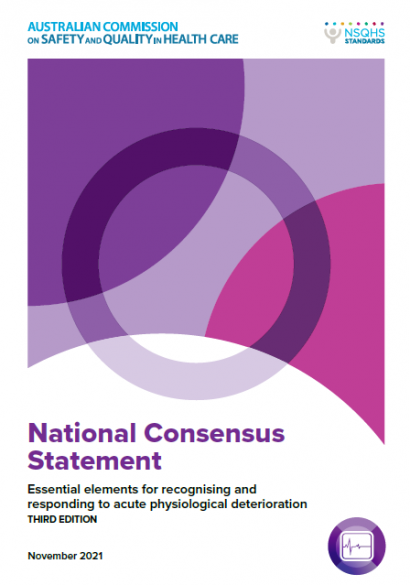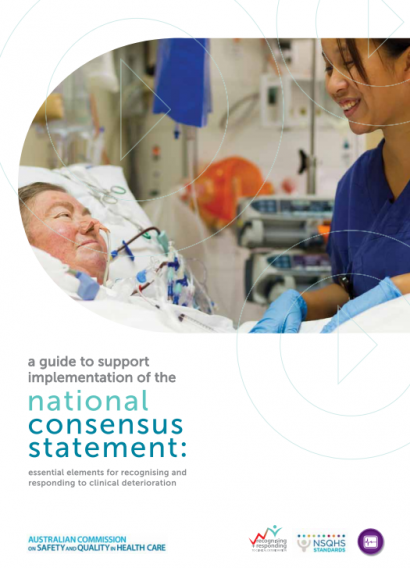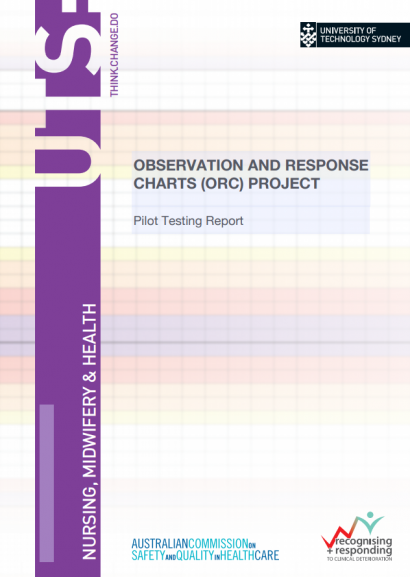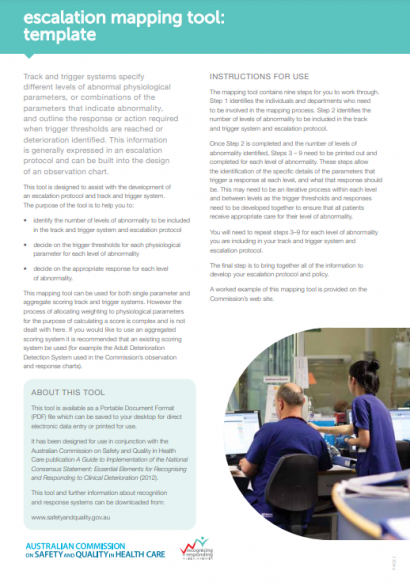- Home
- Our work
- Recognising and responding to deterioration
- Recognising and responding to physiological deterioration
NSQHS 8 Recognising
Recognising and responding to acute physiological deterioration
Ensuring that patients who deteriorate receive appropriate and timely care is a key safety and quality challenge. The Commission has introduced a range of systems to better manage recognition of and response to acute physiological deterioration.
The Commission commenced a program of work in 2008 with the goal of improving the recognition of, and response to, acute deterioration in hospitals and other acute care facilities.
Tools and resources
The National Consensus Statement: Essential elements for recognising and responding to acute physiological deterioration was endorsed in 2010 by Health Ministers as the national approach for recognition and response systems in Australian acute care facilities. The Consensus Statement was reviewed and updated in late 2016 and is currently under review.
The Commission also commenced work in 2012, examining strategies to improve the safety and quality of end-of-life care in hospitals.
A guide was released in 2012 to support implementation of the National Consensus Statement: Essential elements for recognising and responding to clinical deterioration. The Consensus Statement was updated in 2016 and again in 2020.
There are also some accompanying quick start guides:
National Consensus Statement: essential elements for recognising & responding to clinical deterioration
This self-assessment and action planning tool will help you to identify gaps in current systems and plan the actions required to achieve Essential element 2: Escalation of care.
The tools and resources can still be used by health service providers to identify strategies for successfully implementing robust recognition and response systems to address acute physiological deterioration.
Monitoring and documenting physiological observations is a key component of recognition and response systems. An observation and response chart is a document that allows the recording of patient observations, and specifies the actions to be taken in response to physiological deterioration.
The purpose of these charts is to support accurate and timely recognition of acute physiological deterioration, and prompt action when deterioration is observed. The way in which observation charts are designed and used can contribute to both the poor recording of observations and failure to interpret them correctly.
Observation and response charts should:
- be designed according to human factors principles
- have the capacity to record the core physiological observations specified in the National Consensus Statement
- specify the physiological parameters and other factors that trigger an escalation of care
- specify the actions required when care is escalated.
For copies of InDesign files of the ORCS developed by the Commission in 2012, send a request via e-mail noting which chart you are interested into the advice centre.
This report details the second phase of a project by the University of Technology to pilot observation and response charts.
Modifying ORCs
Changes to observation and response charts may be appropriate depending on the population and services provided. Implementing a new chart or modifying an existing chart requires a number of steps. Hospitals and health services must also ensure that any action taken to change existing observation charts are consistent with state or territory decisions or programs. The Commission has developed supporting resources.
Mapping escalation processes
Facilities are responsible for evaluating their systems to ensure that trigger thresholds, parameters, and responses are safe for use in the population of patients for whom they provide care. An escalation mapping exercise should be done to identify the parameters, thresholds, levels of abnormality, and responses that will be included in the recognition and response systems.
An escalation mapping exercise should be done to identify the parameters, thresholds, levels of abnormality, and responses that will be included in the recognition and response systems.
Trigger thresholds
There is little evidence regarding ideal trigger thresholds for use in recognition and response systems.
The clinical parameters and trigger thresholds included on the Commission observation and response charts have been subject to review by the program’s Advisory Committee. Trigger thresholds may need to be adjusted by some hospitals in order to increase their specificity.
Response actions included on the charts are generic placeholders only and must be altered to provide clear and specific local guidance on the process for escalating care.
In 2010 the Commission conducted a national survey about the recognition and response systems and practices in place across Australian hospitals. The results of this survey and discussion of implications for the work of the Commission is available to download:
Tools are available to help facilities to collect the data required to evaluate some of the different aspects of recognition and response systems for clinical deterioration.
Clinical deterioration audit and evaluation tools
These include:
Quality measures for recognition and response systems
A series of quality measures have also been developed. These enable facilities to review their processes and outcomes relating to recognising and responding to clinical deterioration.
Facilities are not required to collect data on these measures and can choose the quality measures that best fit with their circumstances. However, the Commission suggests that all facilities should include the key measures listed below in their evaluation systems.
Facilities may choose additional measures to focus on depending on the stage of implementation of their recognition and response systems. For example, facilities could audit the documentation of core physiological observations and compliance with monitoring plans or policies when a new observation and monitoring policy is introduced.
Facilities with well-embedded systems may focus on rates of failed escalation with mortality, rapid response activation and unexpected in-hospital death as measures of ongoing performance.
Key measures
- In-hospital death rates
- Rapid response activation rates
- Rates of failed escalation with mortality
- Unexpected cardiopulmonary arrest rates
- Unexpected in-hospital death rates
Additional measures
- Activation of patient, family and carer escalation
- Awareness of patient, family and carer escalation
- Clinical documentation after rapid response system calls
- Compliance with monitoring plans or policies
- Documentation of core physiological observations
- Escalation of care
A PDF that includes all of the quality measures is available here.
There are detailed specifications for a number of quality measures that facilities can use to review their processes and outcomes relating to recognising and responding to clinical deterioration.
Quality measures to support evaluation
Regular review of, and action on, markers of quality of care is an integral part of quality improvement. It is important to build processes into clinical governance frameworks to allow routine collection, review and action on timely and targeted data.
The Commission's detailed specifications for quality measures are the most useful for facilities to use to enable robust evaluation of recognition and response systems, but they are not mandatory.
See also the audit and evaluation tools above.
Audit frequency
The frequency of data reviews or audits will vary according to the measure being used and the context of the health service. For example, measures such as unexpected cardiopulmonary arrest or failed escalation with mortality might be measured monthly or quarterly in a large hospital, but only annually in a smaller day surgery hospital where such events are rare.
Audit frequency may also vary depending on the stage of implementation. For example, the documentation of core physiological observations might be audited weekly or monthly in the initial implementation phase, but only quarterly or biannually when systems are well embedded.
Quality measures aims
These quality measures have been put forward to support local evaluation and quality improvement.
They are not designed for performance monitoring or benchmarking. The Commission does not require collection of information about these measures; however, they do align with
- the National Safety and Quality Health Service Standards (second edition),
- current and proposed processes for data collection where they exist at a state and territory level
- the rapid response system indicators included in the Australian Council of Healthcare Standards Clinical Indicator Program.
ANZCOR Guidelines
The ANZCOR (Australian and New Zealand Committee on Resuscitation) guidelines provide those involved in resuscitation education and practice with recommendations based on scientific evidence.
Please note: Guidelines may be modified at any time and are only current from the day of printing.
Managing deteriorating patients
A free eBook for everyone who responds to deteriorating hospital in-patients
This book has been written for team members and leaders of hospital rapid response teams who attend deteriorating patients. It provides pragmatic advice on a number of topics.
Recommendations for Rapid Response Teams (RRTs) and Critical Care Outreach (CCO) services in the context of the COVID-19 pandemic
A document from the International Society for Rapid Response Systems that outlines specific safety recommendations in the setting of a pandemic
Ten Steps Toward Improving In-Hospital Cardiac Arrest Quality of Care and Outcomes
A consensus article published in the Resuscitation journal to support improvement in the care and outcomes of in-hospital cardiac arrest
Systems for patient and family escalation have been implemented nationally. Some health service organisations have implemented systems that are specific to their local circumstances and some have state-wide programs. See below for links to information about these programs.
- New South Wales: REACH program
- Queensland: Ryan’s Rule
- South Australia: You’re worried, we’re listening
- Victoria: HEARMe
- Western Australia: Aishwarya’s care call.
- Northern Territory: REACT.
COMPASS® program aims to improve the early recognition and timely management of deteriorating patients and is about pointing health care professionals in the right direction.
Standard observation charts are available in both paper and digital form for adult, paediatric, maternity services and emergency departments in NSW.
Clinical Excellence Queensland has developed a suite of observation and response charts to suit the wide variety of populations and services including:
- Queensland Adult Deterioration Detection System (tertiary and secondary hospitals)
- Queensland Adult Deterioration Detection System (rural and remote hospitals)
- Emergency Department Queensland Adult Deterioration Detection System (Q-ADDS)
- Emergency Department Children’s Early Warning Tool (CEWT™)
- Children’s Early Warning Tool (CEWT®) < 1 year, 1-4 years, 5-11 years, and 12-17 years
- Neonatal Early Warning Tool (NEWT) Birthing Services / Postnatal Ward (28 days or less)
- Emergency Department Queensland Maternity Early Warning Tool (Q-MEWT)
- Queensland Maternity Early Warning Tool (Q-MEWT) antenatal
- Queensland Maternity Early Warning Tool (Q-MEWT) postnatal
For more information or to request a copy of the charts please contact Queensland Health at RMDP@health.qld.gov.au
Rapid Detection and Response (RDR) Observation charts were introduced throughout SA Health in 2012/2013.
The Victorian Children’s Tool for Observation and Response (ViCTOR) Charts were developed to support special care nurseries, paediatric units, emergency departments, urgent care centres and recovery units to standardise the record of paediatric vital signs.





